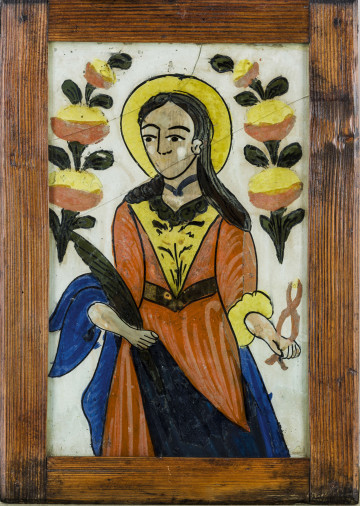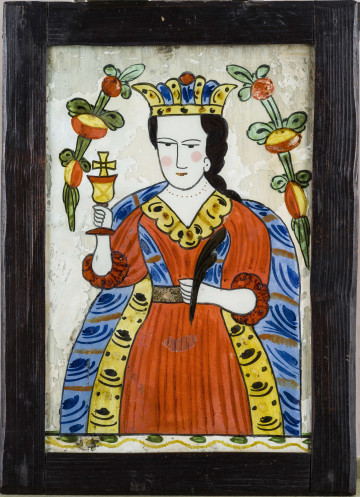
Christ Crucified
1801 — 1900
National Museum in Lublin
Part of the collection: Folk Art of the Lublin Region (17th–1st half of the 20th c.)
Painting on glass has become very popular in Poland thanks to numerous workshops creating for audiences from small towns and villages (see E/260/ML, E/262/ML, E/9489/ML, E/16842/ML, E/16844/ML, E/17350/ML). Each developed their own patterns and a different painting technique. The paintings from the Lublin workshop were characterised by a formal similarity: a dark blue, almost navy blue background of a subdued shade, a delicate outline drawn with a thin pen line, red in the parts of the body and black on other details of the representation, and a floral ornament resembling a developed rose, "seen in profile against a background of leaves spread flat and surrounding the flower from three sides". The colour of the ornament was always the same: the flower was red, carmine or cinnabar with a watery black or white border and the leaves were dark green with a ruffled black decorative veining. Popular Lublin images: St Barbara or St Catherine, Our Lady of Czestochowa or Christ Crucified or in the grave, were often accompanied by beautifully calligraphed captions.
The way of drawing the human figure, especially in the representations of the Crucified Christ stood out in the Lublin paintings. It is clearly visible that the painter was aiming at achieving decorative-rhythmic effects, without considering anatomy, which he did not try to recreate, but treated as a starting point for an artistic concept.
The Crucifixion scene was very popular in folk glass painting, not only in the Lublin region. The subject adopted various iconographic schemes, often modelled on well-known works of religious painting, especially from the Baroque period. Some versions have been so simplified in terms of content and form that they have turned into original works of folk art, which today can hardly be considered copies of famous paintings from indulgenced churches. Christ, usually depicted alone, was then often presented in a decorative frame composed of the instruments of the Passion or in the company of the sun and the moon with human facial features.
Author / creator
Dimensions
cały obiekt: height: 21 cm, width: 29 cm
Object type
picture
Material
glass, oil-based paint
Creation time / dating
Creation / finding place
Owner
The National Museum in Lublin
Identification number
Location / status

1801 — 1900
National Museum in Lublin

1801 — 1900
National Museum in Lublin

1801 — 1900
National Museum in Lublin
DISCOVER this TOPIC
Museum of King Jan III's Palace at Wilanów
DISCOVER this PATH
Educational path